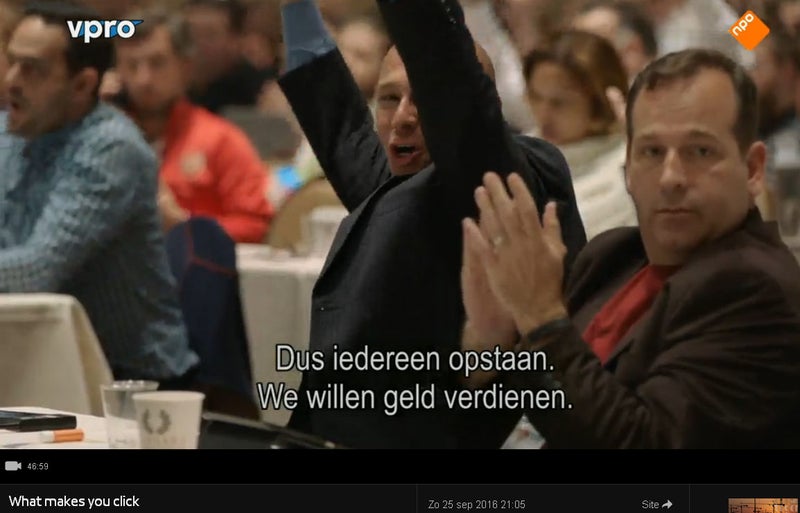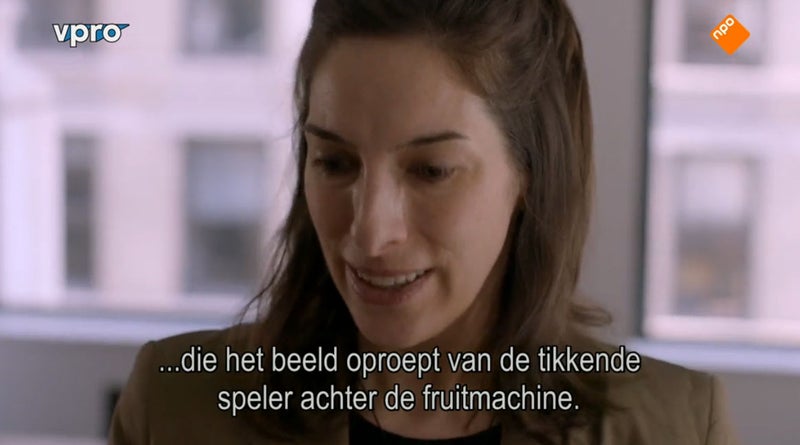


Dutch tekst: So everybody stand up. We want to make money





So everybody stand up. We want to make money
So, influencing the Internet is getting stronger
which determines how you think about the day...



They try to make everyone addicted
They can not tell where their finger ends and the screen begins.
Gamblers often have the feeling that they become one with their gambler-machine



They don't believe it really, but describe a feeling.
They think they know what is going to happen
You get the rapid repeated interaction with the game.



.. Where time, space, money value and self-consciousness disappear.
Even if they win, they do not stop. Profit is not the objective.
The jackpot only serves to that money back to the gamble-machine



... And keep playing, keep in that daze.
So how can we encourage the exchange and efficiently ...
Between device and gambler so we can offer fast and continuously produce.



With rewards, levels and bonuses, you bind people to you.
... But also the additional adverse effects.



Business value is increasingly measured by the Star clicks and likes.
It is a kind of nano-monestatie of human experience
... Which evokes the image of the ticking player behind the slot machine.
Deceit of technology
Bedrog van technologie
A few months ago it was ask me to give lessons in technique.
The problem is that I don't understand very much of technique. Sometimes me it could be just only a tool. But if I really use technique instruments, it makes me many times a slave of the technique and I became very lazy. And than I am busy with something that lose my attention very quickly. Also I see this often by other people that became like a slave of commerce.
Een paar maanden geleden werd ik gevraagd om les te geven in techniek. Het probleem is alleen dat ik niet veel van techniek begrijp. Ja, soms kan het een handig hulpmiddel zijn. Maar vaak als ik techniek instrumenten gebruik, voel ik me al gauw afhankelijk van de techniek en wordt ik zelfs vaak slaperig van. Ik verlies er heel snel mijn aandacht door. Ook zie ik dit veel bij andere mensen gebeuren en dan zie ik ze als een slaaf van de techniek, met nauwelijks nog een eigen inbreng.
You can click here to look to the Dutch television program:
Door het online zijn en het downloaden van het VPRO-programma, krijg ik al veel ongewenste klikken
- Lid worden van de VPRO gids
- Downloaden van een programma om het te kunnen bekijken
- Een virusscanner die ik niet wil hebben word meegeleverd
- Na installatie 10 gratis stockafbeeldingen (???)
By being online and downloading the VPRO program, I get already many unwanted clicks
- Joining the VPRO Guid
- Download a program to view it
- A virus scanner that I would not have become included
- After installation I got 10 free stock images (???)-





Wat doet je klik / What makes you click
Het faillissement van warenhuizen en schoenenreuzen illustreert het: ons koopgedrag verschuift in hoog tempo van offline naar online. Maar welke vernuftige slimmigheden en andere digitale wetmatigheden maken dat wij onze digitale winkelwagen zo vol mogelijk gooien? Of zo lang mogelijk op een website verblijven? Of op een bepaalde kandidaat stemmen? Op dit moment vindt het grootste psychologische experiment ooit plaats. Elke dag worden een miljard mensen getest op internet. Via A/B testen en analyse van de datasporen die we online achterlaten, wordt er in exponentieel tempo kennis vergaard over onze voorkeuren en gedragingen, maar vooral over hoe ons brein werkt. Wie gebruikt deze kennis? En waarvoor? Er is een heel nieuw vakgebied ontstaan van user experience architecten en online persuasion officers. Hoe gebruiken, manipuleren én misbruiken deze digitale datadealers onze gebruikerservaring? Niet alleen bij het doen van aankopen, maar ook waar het onze vrije tijd en politieke voorkeuren betreft. Loopt het bedrijfsleven, dat miljoenen testen tegelijk uitvoert, hierin niet mijlenver vóór op de wetenschap en de overheid? Inmiddels pleiten de bouwers van deze digitale verleidingstechnieken, onder wie zelfs voormalige Google-medewerkers, zélf voor het instellen van een ethische code. Wat betekent het als uitvoerders van experimenten zélf gaan vragen om beperking van hun macht en mogelijkheden? Met: Bart Schutz (chief inspirational officer 'Online Dialogue' Utrecht), Natasha Dow Schüll (antropoloog 'Addiction by Design'), James Williams (persuasion technology onderzoeker, Oxford Data Experience Lab), Pepijn Rijvers (chief marketing officer Booking.com), Timothy Prescott (politieke data-analist voor o.a. de Obama-campagne) en Tristan Harris (user experience ontwerper 'Time Well Spent' beweging)
http://www.vpro.nl/programmas/tegenlicht/kijk/afleveringen/2016-2017/what-makes-you-click.html
What makes you click
The bankruptcy of department stores and footwear giants illustrates it: our purchasing behavior rapidly shifting from offline to online. But what do clever tricks and other digital patterns that we throw our digital shopping cart as full as possible? Or as long as possible to stay on a website? Or vote for a particular candidate? At present, the largest ever found psychological experiment instead. Every day, a billion people will be tested on the Internet. Through A / B testing and analysis of the data traces we leave behind online, there gained knowledge in exponential pace on our preferences and behaviors, but especially about how our brain works. Who uses this knowledge? And for what? There is a whole new field creation of user experience architects and online persuasion officers. How to use, manipulate and exploit this digital data distributors of our user experience? Not only when making purchases, but also as regards our free time and political affiliations. Runs the business, that millions of tests at one time, not in this for miles ahead of the science and the government? Meanwhile, the builders argue this digital seduction techniques, including even former Google employees themselves to set up a code of ethics. What does it mean if perpetrators of experiments will itself require limiting their power and possibilities? : Bart Schutz (chief inspirational officer Online Dialogue Utrecht), Natasha Dow Schull (anthropologist 'Addiction by Design), James Williams (persuasion technology researcher, Oxford Data Experience Lab), Pepin Rijvers (chief marketing officer Booking.com) Timothy Prescott (political data analyst for eg the Obama campaign) and Tristan Harris (user experience designer 'Time Well Spent' movement)



Maak jouw eigen website met JouwWeb